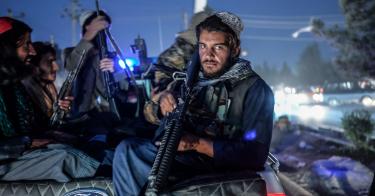President Biden’s policy pronouncements may look great on bumper stickers, but they have fewer calories than Coke Zero. “The border is closed” was one empty promise. “Inflation is temporary” was another.
Just as vacuous was the president’s promise that he will prevent the next 9/11 by fighting terrorism “over the horizon.” No way that can work.
“Over the horizon capability” is a legitimate military term. It means being able to hit targets from a safe place at great distance, without benefit of a military presence in the area.
Modern militaries, not just the United States, have been building out these capabilities for years, using long-range precision-guided weapons or drones paired with long-range or space-based sensors that can pinpoint targets.
>>> Biden’s Risky “Over the Horizon” Counterterrorism Plan for Afghanistan
Even before the last American troops had skedaddled out of Kabul, military experts complained that, without eyes, ears and influence in Afghanistan, al Qaeda and their ilk would flood back into the country and re-establish a terrorist safe haven from which to launch a new round of 9/11s.
Chairman of the Joint Chiefs of Staff Gen. Mark Milley admitted during testimony yesterday that “the conditions could be set for a reconstitution of al Qaeda and/or ISIS.”
Biden has a quick answer: No worries, the U.S. would eliminate these threats from afar.
What the president did not share with the American people were all the reasons (which the Pentagon surely must have told him) why “over the horizon” can’t do that job.
For starters, targets have to be identified accurately. The Aug. 29 drone strike in Kabul that killed 10 innocent civilians and zero terrorists reminds us that is easier said than done. Don’t forget, the terrorists have been droned by Americans for 20 years. They have written books on how to avoid being targeted. They aren’t going to sit around.
And the Taliban aren’t going to make the job any easier. They’ve already started complaining that U.S. surveillance overflights violate their airspace.
Further, while over-the-horizon attack assets are, by definition, located outside the battle zone, proximity still matters. And the basing options for U.S. attack assets are getting further and further removed from Afghanistan’s borders.
That means that it will be more expensive for the U.S. to conduct operations, and the operations will be less likely to succeed.
After all, the greater the response time (from locating a target to delivering munitions to take out the target), the less likely you are to actually hit a mobile target.
Additionally, the more attack assets are concentrated on Afghanistan, the less these assets are available to support other missions — like dealing with China.
Finally, who says over-the-horizon targeted killings work as a counterterrorism strategy? Well, pretty much nobody. Not there is not anything wrong with killing bad people. But killing bad people is a tactic, not a strategy.
When the Global War on Terrorism started, the U.S. identified something like 300 key al Qaeda leaders to be taken out. By the end of Obama’s presidency, we had killed about 3,000 of them.
>>> Biden Administration Stonewalls on ISIS-K Strikes—Which Means They Were Failures
Yet the core of al Qaeda hid in Iran and now are coming out to repopulate the movement. Donald Rumsfeld was right — you can’t just kill your way out of global terrorism.
In addition to hunting terrorists, what really kept al Qaeda and their ilk down all these years is that we deprived them of safe havens in places like Afghanistan, Iraq and Syria.
Dealing with transnational terrorism is like flossing your teeth: as soon you as stop, the rot starts to set in again. Biden is done with flossing.
The terrorists, however, are not done with Biden.
They are dreaming of the next 9/11 right now, redemption for the 20 years of humiliation from America. Biden has given them new space to run. They will.
This piece originally appeared in the New York Post




